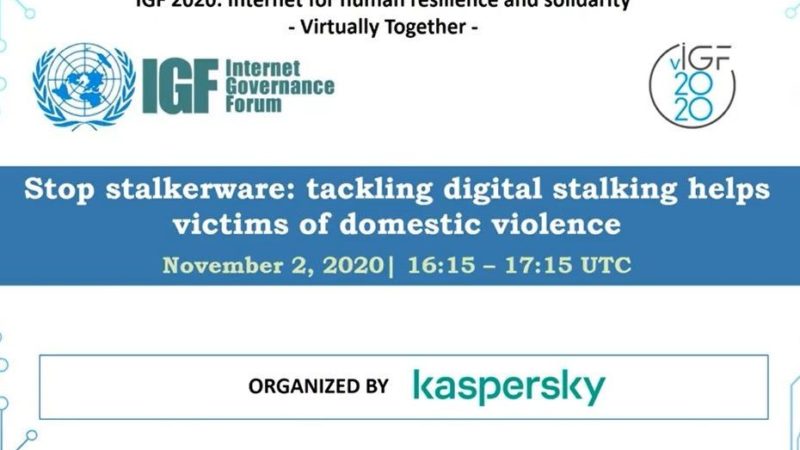
‘Stop Stalkerware’ discussion at the UN Internet Governance Forum
The Fifteenth Annual Meeting of the Internet Governance Forum (IGF) is hosted this year online by the United Nations under the overarching theme “Internet for human resilience and solidarity”. On November 2, the IGF hosted the pre-event session “Stop stalkerware: tackling digital stalking helps victims of domestic violence”. At this session, a few members of the Coalition Against Stalkerware – namely the National Network to End Domestic Violence, Cyber Peace Foundation with their initiative Cyber Diplomat and Kaspersky – discussed the issue of stalkerware together with a representative from Europol’s European Cybercrime Center EC3 in order to identify ways to act together against this developing cyber threat.
Following are a few key points that were raised by the panelists:
- Stalkerware is commercially available software that enables someone to digitally spy on the private life of another person via their phone or computer usually without the consent and knowledge of the victim. Often used in the context of domestic violence, stalkerware is a growing issue at global level. “In 2019, we detected on global level an increase of 67% of stalkerware on our users’ mobile devices compared to 2018. This year so far, we have documented over 48,000 installations of such software worldwide so far. And we are not the only ones who see this problem rising,” informed Christina Jankowski, Senior External Relations Manager at Kaspersky.
- Despite the risk of devices becoming infected by spyware, survivors have a right to technology. “We have to make sure that survivors have access to safe internet, safe phones, safe devices so that they can stay connected, reach out for help and, most importantly, be empowered to make the best decisions for themselves,” emphasized Rachel Gibson, who is Senior Technology Safety Specialist at National Network to End Domestic Violence. Rachel also shared her experience working with survivors of stalkerware, highlighting that the technology facilitated abuse are “old behaviors with new tactics”.
- It became clear in the discussion that stalkerware is not just a technical issue but a global social problem. Therefore, it is important that advocacy and non-profit groups working with victims and perpetrators of domestic violence, tech companies and intergovernmental organizations work together.“We can combat this threat only by using a multi-stakeholder approach. We see that use of stalkerware is a violation of basic human rights where victims are held hostage. In this case, society must act collectively to ensure security,” demanded Sanjana Rathi, who is working for the Cyber Diplomat, an initiative founded by the Cyber Peace Foundation where she has been active as Research Analyst.
- What’s more, it is important to increase awareness about stalkerware in the public and inside institutions as well as to increase private users’ knowledge how to minimize risks. “Through creating awareness and strong public-private-partnerships we can prevent a lot of these crimes from happening in the first place,” said Philipp Amann, Head of Strategy at Europol’s European Cybercrime Center EC3. Sharing his experience on working in the field of cyber abuse, Philipp shed light on how intergovernmental organizations work to combat crimes by illustrating international law enforcement operations supported by Europol’s EC3 targeting users of Remote Access Trojans spyware. He also highlighting some of EC3’s pan-European awareness activities like the #SayNo campaign focusing on the online sexual coercion and extortion of children.
The session has been watched by around 150 viewers and got very positive feedback. Through the use of online polls, live participants had the opportunity to share their experiences. It was interesting to see that 40% from the live audience have suspected being affected by stalkerware themselves or a friend or relative. With 82% of the audience largely agreeing on the fact that stalkerware should be legally prohibited.
Asked what ideas attendees have to address the issue, there was a great variety of bright suggestions, among them to increase digital literacy, trainings for law enforcement, safety-by-design obligations for tech products as well as multi-stakeholder partnership.
Not least, at the session Kaspersky GReAT expert Felix Aimé presented an ongoing project aiming at facilitating the detection of stalkerware and other malicious spyware installed on mobile devices.
The replay of the November 2 online event can be found here: https://youtu.be/rc3qQAraKDU?t=1005 The Coalition Against Stalkerware remains grateful for the opportunity to have been part of the UN’s Internet Governance Forum to discuss this important issue and would be pleased to remain in contact with Europol’s European Cybercrime Center to combat stalkerware.

Report shows stalkerware is not declining
Nearly 30000 people globally were affected by stalkerware, accor...
Read more
Coalition Against Stalkerware calls on Apple to mitigate abuse of WiFi Sync
UK cybersecurity firm Certo, a partner of the Coalition Against ...
Read more
Stalkerware maker fined in the US and required to notify victims
The Coalition Against Stalkerware is very happy with the news th...
Read more